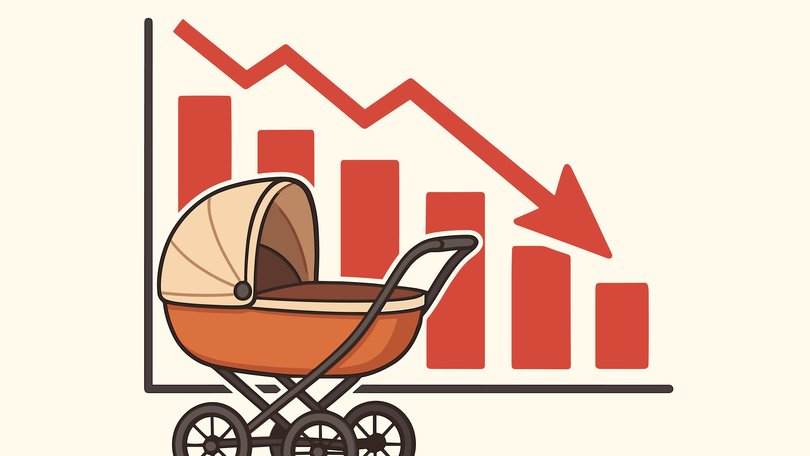EDITORIAL: Baby bust means we’re headed for a changing nation
EDITORIAL: It’s unlikely we will be able to birth our way out of this problem without radical — and likely unwelcome — cultural change.

Blame it on the smorgasbord of potential partners presented to us by dating apps, leading to an epidemic of analysis paralysis. Or maybe it’s the housing crisis, meaning we literally have no space in our lives and homes for kids.
Perhaps it’s the general feeling of gloom and the unshakeable feeling that humanity’s overconsumption of the Earth’s finite resources is hastening planetary collapse.
Whatever the reason, Australians are having fewer children than ever before.
Sign up to The Nightly's newsletters.
Get the first look at the digital newspaper, curated daily stories and breaking headlines delivered to your inbox.
By continuing you agree to our Terms and Privacy Policy.On average, Australian women now have just 1.48 babies each during their lives. That’s well below the replacement rate, meaning without migration, our population would begin to contract.
To some, disheartened by skyrocketing house prices and declining living standards, a fall in the birth rate might be welcome.
Fewer babies today means fewer people to bid against you at auctions in the future and less traffic on your commute.
But it can pose serious problems.
We won’t birth our way out of this problem without radical change
A shrinking population leads to economic decline through labour shortages, stagnating productivity and a smaller tax base (particularly worrisome as the burden of pensioners grows).
Societies need young people. A recent study of Nobel Prize recipients found that winners did their most innovative, groundbreaking work early in their careers, between the ages of 25 and 29.
While older people do plenty of creative work also, the great leaps forward tend to come courtesy of the young.
We are sleepwalking into a society devoid of dynamism.
This isn’t a uniquely Australian problem. It’s something that governments all across the developed world are grappling with. Even China, which only a decade ago lifted its longstanding one-child policy aimed at containing unsustainable population growth, is struggling.
According to the International Monetary Fund, China’s population is expected to drop 156 million in the coming 25 years, ahead of Japan (18 million) Russia (7.9 million) and Italy (7.3 million).
In Australia, we have so far managed to stave off the ill effects of our falling fertility by boosting our population externally through migration.
Handily, there is no shortage of people who want the chance to experience the blessings of life in the Lucky Country.
But that approach isn’t without its detractors.
Migration has become one of Australia’s hot button issues, fuelled by a belief that migrants are to blame for growing housing unaffordability.
According to a poll commissioned by conservative think tank the Institute of Public Affairs, 60 per cent of Australians believe immigration is too high.
Those aged between 25 to 34 were the only demographic in which immigration scepticism wasn’t the majority view.
So are we in need of another Costello-esque baby bonus to arrest our freefalling fertility and boost TV sales? Or do we stay the course with migration?
It’s unlikely we will be able to birth our way out of this problem without radical — and likely unwelcome — cultural change.
A return to a 1950 birth rate of three children per woman would be unlikely without the return of other aspects of 1950s life.
Today, women have greater opportunity to pursue purpose in other aspects of their lives outside childrearing.
It means we are heading for a changing Australia, and it is up to our leaders to set the course.
